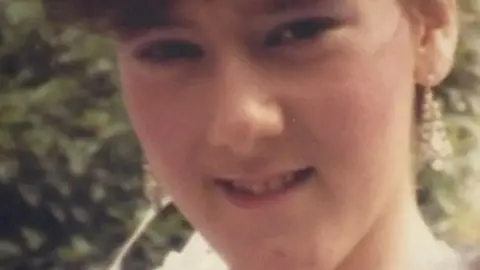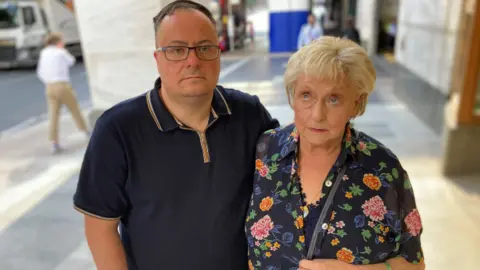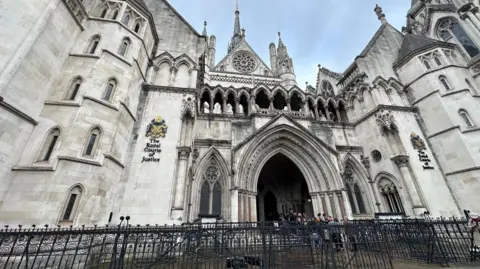Killer 'ready for open prison despite allegations'
 Cleveland Police
Cleveland PoliceA murderer who was convicted after a change in the double jeopardy law is ready for release to an open prison despite having been found to have committed other offences, a parole board has heard.
William Dunlop was jailed for life in 2006 for the murder of mother-of-one Julie Hogg, 22, in 1989, who he strangled and hid behind a bath panel at her home in Billingham, County Durham.
Having served the minimum term set by a judge, Dunlop, now 61, has applied for release.
The Parole Board is normally held in private but his case is being heard partially in public, with a decision to be announced at a future date.
Professionals recommend moving him to an open prison but not release, the panel heard, but Ms Hogg's family, who campaigned for his conviction, oppose Dunlop being moved out of high-security conditions.
 Family handout
Family handoutThe panel of four, which is led by a retired crown court judge, appeared via video link at the Royal Courts of Justice in London from an unnamed prison.
The panel chairman said they had a dossier of more than 1,400 pages about Dunlop and had heard from Ms Hogg's family about the impact of her murder in a closed session.
He said the panel had considered some 900 pages relating to at least 12 other allegations which had been made against Dunlop but not prosecuted, and made several findings of fact, with some of the accusations proved on the balance of probabilities.
Details of the allegations were not given to preserve the privacy of the complainants, the chairman said, but they would be considered when determining what risk Dunlop posed.

A prison offender manager, who had worked with Dunlop since his arrival at her prison in December 2022, said she was confident he should be moved to an open prison.
She said Dunlop had
- shown genuine remorse and shame for killing Ms Hogg and "empathy" and understanding of the impact the murder had had on her family and the wider community
- been "open and honest" with professionals and spoken about his previous offending and "patterns of behaviours"
- held enhanced status in prison since 2011, meaning he was "consistently well-behaved" and held a "trusted" job involving supporting other prisoners
- partaken in intensive therapy and programmes to address "unhelpful thinking" and develop "risk management skills"
- understood and had strategies for handling his "risk factors", including substance abuse and heightened emotions
- never expressed violent sexual fantasies, failed a substance test or had any "adjudications" made against him
- fulfilled the suggestions made by the secretary of state after a previous application for parole was rejected in 2022
- consistently complied with custody rules and posed a "low" risk of absconding
The manager also said there was no further work to be done with him in a closed prison and it was "important" he now be tested in open conditions.
She said Dunlop still denied one of the allegations despite the panel having found it proven, but she believed that was because he felt "shame" rather than deliberately lying about it.
She said his full release was not being recommended, as he had been in prison for a long time and being out in the community could be "destabilising" and lead to a return to his "unhelpful thinking" which he had developed coping strategies for.
A key worker for Dunlop said the killer "wished he could turn back time" and undo the murder, adding he claimed "wasn't in a good place" and was "angry" and "rageful" at the time.
The key worker also said Dunlop was "aggrieved" at the panel finding he had committed other offences and had complained he had not been "trusted", adding Dunlop had "owned up to" certain parts of the accusations.

The chairman said Dunlop strangled Ms Hogg on 16 November 1989, then "mistreated" her body before hiding it beneath a bath, where it was found on 5 February 1990 by her mother Ann Ming.
Two juries "disagreed" about whether he was guilty, with prosecutors then following convention by not seeking a third trial, the chairman said, and Dunlop being formally acquitted.
In 1997 Dunlop attacked an ex-girlfriend and her new partner and was jailed for seven years for wounding with intent.
During that incarceration, he admitted to a prison guard he had killed Ms Hogg, leading to him being jailed further for perverting the course of justice.
'Fear and notoriety'
Dunlop was unable to be tried again for her murder because of the so-called double jeopardy law, which had been in existence for 800 years and prevented a person being prosecuted again for a crime which they had been cleared of.
Ms Ming led a successful campaign to overhaul the law, which resulted in Dunlop admitting murder and being jailed at the Old Bailey for life with a minimum term of 17 years in 2006.
The chairman said Dunlop had a "relatively minor record" of offending dating back to the 1970s when he was 12, but in the late 1980s started committing more violent crimes for which he was not prosecuted.
Dunlop cultivated a reputation of fear and notoriety which made his victims "frightened" to speak out, the chairman said.
The hearing continues, with the parole board chairman saying the panel would consider what risk Dunlop might pose in the future and whether that could be managed.
Follow BBC Tees on X, Facebook, Nextdoor and Instagram. Send your story ideas to [email protected].
